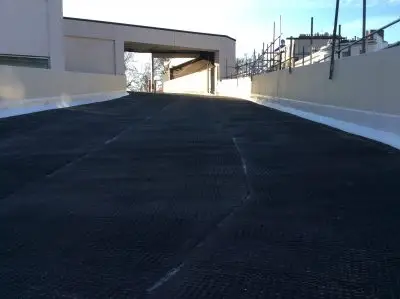Royal Hotel, Lancaster – IKO Permapark
Phase 1: 650m² main car park area
Phase 1 of the car park installation was above the popular ballroom which is a highly sensitive area due to the number of functions that are held throughout the year. The ballroom also consists of a number of very large chandeliers which are fixed to large metal plates above the ceiling directly below the installation area.
These plates became visible when the existing car park build-up was removed. Extra care and attention were required to avoid any likely damage to these valuable chandeliers. If these became unsafe or loose at any point, the ballroom would be unusable, and functions may need to be cancelled.
Phase 2: 550m² ramp
Due to the close proximity to hotel patrons, the ramp area was very noise sensitive and included the same types of restrictions imposed on phase 1.
The ramp was stripped up the centre reservation comprising of granite kerb stones along with 100mm thick sand and cement screed. Around 210 tonnes of spoil was removed and the new mastic asphalt waterproofing, IKO Permapark Insulated Specification (PA4) System was installed.
PA4 system was specified as the installation was over a habitable space and an insulated system was required to have a better control over temperature. The installation comprised of 30mm nominal, 30mm thick single coat IKO Permapark Paving.
Solution and installation
The IKO Permapark Mastic Asphalt material was delivered direct from the factory in 18 tonne tankers. As access to the site was quite limited, the material had to be stored 800m away from the installation area.
It was then transported to the installation area by using asphalt luggers or “SPAM’s” [Self Propelled Asphalt Mixers]. This drastically reduced the time taken to install the material, negating the requirement to ‘fetch and carry’ the product from the storage area to the area of application.
While excavating the specific areas, additional thickness of 100mm build-up were discovered. Around the more sensitive areas (i.e. chandelier plates), using heavy machinery was not an option.
Pics and shovels were used to remove the approx. 80 tonne of spoil as quietly as possible, without losing any time on the project.
The spoil was then picked up in the bobcat and taken to a small tipper which was then driven down to the main compound and tipped. Grab lorries removed the spoil to a certified tip.
Despite the unexpected additional build-up that needed to be excavated, strict noise and limited access issues, the works were completed on time and to excellent standards and Phase 3 (1300m² of works) has now been awarded to Infallible Systems.
